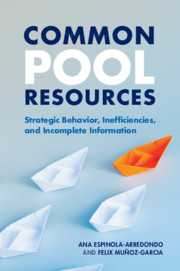Book contents
- Frontmatter
- Contents
- List of Figures
- List of Matrices
- Preface
- 1 Introduction
- 2 Common Pool Resources in a Static Setting
- 3 Common Pool Resources in a Dynamic Setting
- 4 Entry Deterrence in the Commons
- 5 Repeated Interaction in the Commons
- 6 Commons under Incomplete Information
- 7 Signaling in the Commons
- Appendix A Game Theory Tools
- Appendix B Solutions to Selected End-of-Chapter Exercises
- Bibliography
- Index
5 - Repeated Interaction in the Commons
Published online by Cambridge University Press: 03 August 2023
- Frontmatter
- Contents
- List of Figures
- List of Matrices
- Preface
- 1 Introduction
- 2 Common Pool Resources in a Static Setting
- 3 Common Pool Resources in a Dynamic Setting
- 4 Entry Deterrence in the Commons
- 5 Repeated Interaction in the Commons
- 6 Commons under Incomplete Information
- 7 Signaling in the Commons
- Appendix A Game Theory Tools
- Appendix B Solutions to Selected End-of-Chapter Exercises
- Bibliography
- Index
Summary
INTRODUCTION
Previous chapters discussed games where firms (e.g., fishing companies or farmers sharing an aquifer) interact only once. These games are also known as “one-shot games” or “unrepeated games,” and can help us model strategic settings in which players do not anticipate interacting again in future periods. In many settings, however, the same group of firms interact several times, facing the same game repeatedly. An interesting feature of repeated games is that they can help us rationalize players’ cooperation, even when such cooperation could not be sustained in the unrepeated version of the game.
Section 5.2 presents a simplemodel of a CPR game, highlighting its similarities with the canonical prisoner's dilemma game. This tractable model helps us in our presentation of repeated interaction in finitely repeated games (Section 5.3) or infinitely repeated games (Section 5.4). Cooperative outcomes, understood as firms exploiting the resource below what they would do in an unrepeated game, cannot be sustained in the equilibrium of the finitely repeated game. Intuitively, firms anticipate that they will be appropriating as much as possible in the last period of interaction, and that such behavior will not be affected by previous history of play. In the previousto-last period, they anticipate such exploitation in the subsequent period, which leads all firms to exploit the CPR at maximal levels on the previous-to-last period too. A similar argument extends to all previous periods until the first, implying that firms choose a high appropriation level during all periods; a big failure in our quest to use repeated games as a tool to promote cooperation in the commons! Fortunately, Section 5.4 considers infinitely repeated games, showing that, in this case, firms may have incentives to cooperate by selecting lower appropriation levels if they assign a sufficiently large weight to their future profits.
MODELING REPEATED INTERACTION
Consider the CPR game in Matrix 5.1, where both firms simultaneously and independently choose between a high and a low appropriation level. Firm 1 selects a row, while firm 2 chooses a column. The first payoff in every cell corresponds to firm 1 and the second payoff to firm 2. When both firms choose Low appropriation, at the bottom right-hand corner of the matrix, both earn a payoff of $a .
Information
- Type
- Chapter
- Information
- Common Pool ResourcesStrategic Behavior, Inefficiencies, and Incomplete Information, pp. 64 - 80Publisher: Cambridge University PressPrint publication year: 2021
